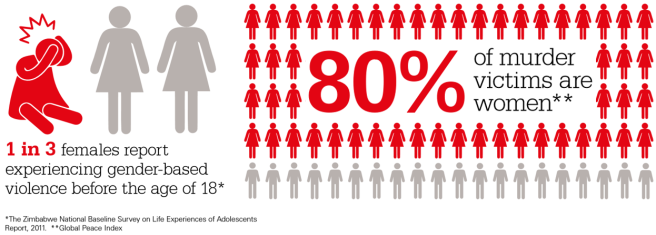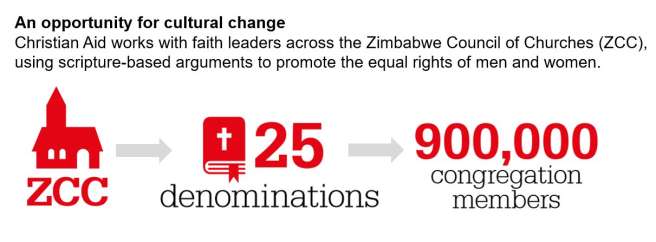Faith leaders championing women and girls, Zimbabwe
Image credits and information

These statistics are shocking, but unfortunately, gender-based violence is part of a broader culture in which women are treated as second class citizens.
Changing the culture to one that enables women and men to contribute equally to society, provides a critical building block from which countries can move beyond poverty.
The role of the church
Rather than standing up against gender-based violence, churches have been perceived as reinforcing negative stereotypes of women and their role in society.
As 80% of people in Zimbabwe regularly attend church, faith leaders are best positioned to champion gender equality. We have been engaging faith leaders on this subject, using scripture as a key point of reference.
Image credits and information

We are working with our local partner Padare, who specialise in engaging men on this subject. Padare has heard concerns from men around threats to their masculinity, believed to be caused partly by the economy and 95% unemployment in the country.
In August 2017, ITL supporter Rose Hudson-Wilkin visited the project in Zimbabwe. Hear about Rose’s experience in this podcast.
Progress to date
Though the success of the project will be judged at the end of its three years, the first six months have been encouraging.
Part of the battle is breaking the silence of communities who turn a blind eye to gender-based violence. In Buhera province, where Padare has been working, there has been significant progress, as community members have been reporting cases of sexual abuse to the police for the first time ever.
Through work with faith leaders, the project strives to create environments where women are valued, in churches and in the wider community, and to equip women to take more of an active role in both spheres.
More than 100 women have participated in leadership training, learning skills in communication, planning, organising, conflict resolution and financial management. These women are members of the Zimbabwe Council of Churches (ZCC), an ecumenical organisation which represents 25 denominations within Zimbabwe.
Lessons learned so far
In the early stages of the project it has become clear that a crucial way to stop the cycle of gender-based violence is to work with the perpetrators.
Staff members of Padare and the ZCC have been trained in counselling and have been working with prisoners in Harare Central Prison. This has provided a chance to apply Padare’s tried and tested approach of working with men to encourage positive masculinity.